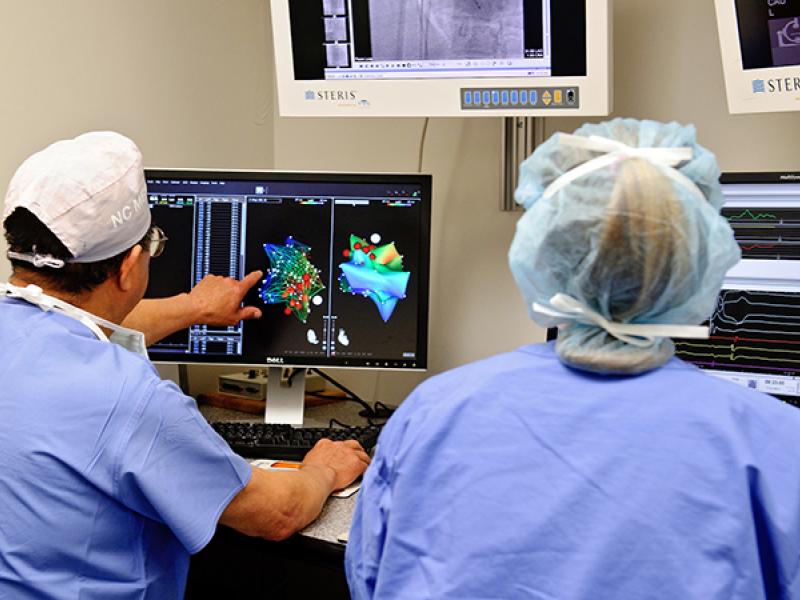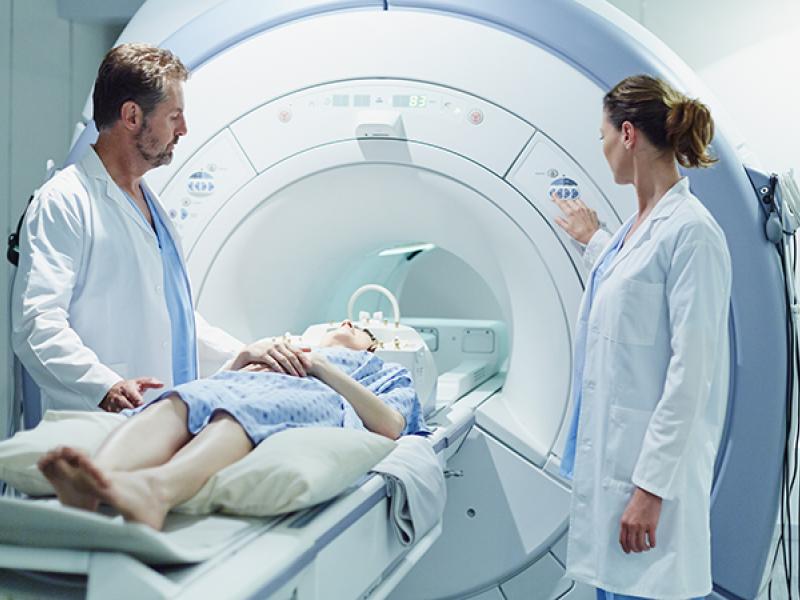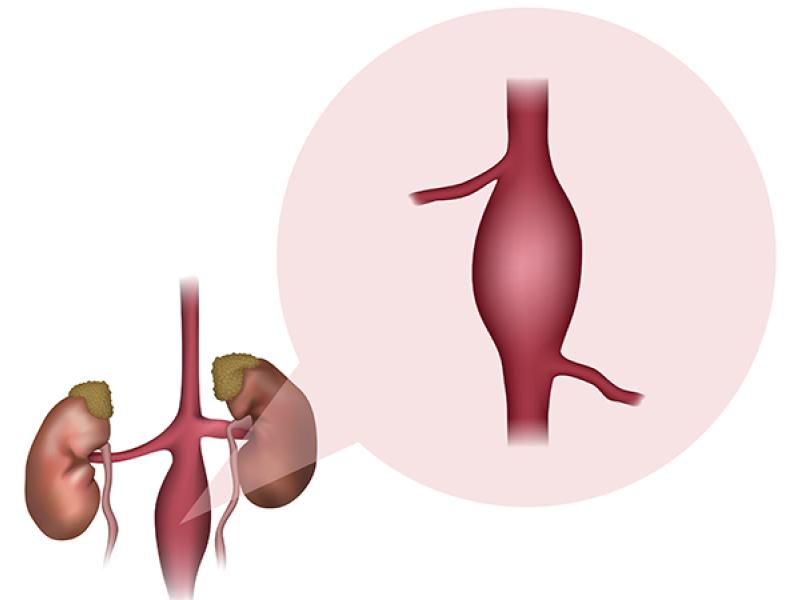Read about the curriculum offered in the Clinical Cardiac Electrophysiology fellowship program.
Clinical Cardiac Electrophysiology Laboratory
Fellows perform diagnostic and interventional electrophysiology (EP) procedures under the direct supervision of EP faculty. Training emphasizes hands-on procedural experience, technical proficiency, and clinical decision-making.
Fellows receive structured instruction in EP laboratory setup, including signal acquisition, amplification, filtering, and interpretation of intracardiac electrograms. Core training includes programmed electrical stimulation, electrophysiologic study design, and interpretation, with emphasis on diagnostic accuracy, indications, risks, and alternatives for both diagnostic studies and catheter ablation.
Procedural training includes vascular access, transseptal catheterization, and simple and complex catheter ablation. Cardiac anatomy is taught in direct correlation with procedural planning and execution.
Fellows are the primary providers for patients undergoing EP procedures. Responsibilities begin with pre-procedural evaluation and informed consent and extend through post-procedural care, including outpatient discharge or inpatient follow-up for 24 hours after the procedure. Fellows write pre- and post-procedure orders, generate procedural reports, communicate findings to the care team, and manage procedural complications under faculty supervision.
Core Competency Year 1 | Core Competency Year 2 |
|---|---|
Medical Knowledge and Patient Care | |
| Complete knowledge of patient history and procedural indications. | Show expert knowledge of alternative procedural options with ability to discuss and explain to patients and EP lab team. |
| Become trained in the theory of arrhythmia and ablation. | Progress to “shows how” and "does” in teaching arrhythmia and ablation theory to cardiology fellows and residents. |
| Learn the indications and society guidelines for ablation procedures. | Learn the cost-effectiveness, the risk-benefit ratio and patient preferences for ablation procedures. |
| Peruse the classic papers in EP diagnosis and ablation techniques. | Analyze and appropriately criticize classic and modern EP literature. |
Patient Care and Procedural Skills | |
| Catheter insertion and manipulation. | Fluoroless manipulation of catheters without radiation use. |
| Management of vascular access including with and without vascular ultrasound guidance. | Recognition of and management of vascular access complications. |
| Transseptal catheterization. | Epicardial catheterization and WatchmanTM procedure. |
| Diagnosis of specific supraventricular and ventricular arrhythmias from interpretation of EP tracings. | Implementation of advanced diagnostic algorithms for resistant arrhythmia such as nodoventricular fibers. |
| Catheter ablation of supraventricular and right ventricular arrhythmias. | Mastery of complex left-sided ablation, including atrial fibrillation and ventricular arrhythmias. |
| Management of patients after EP ablation procedures. | Management of immediate and delayed procedural complications. |
Professionalism | |
| Pre-procedural management, recognition of co-morbid disease. | Precise implementation of appropriate criteria for ablation procedures. |
| Post-procedure management, including medications, radiologic studies and clinical status. | Early recognition of post-ablation issues requiring urgent management with appropriate intervention. |
| Sensitivity to personal and cultural issues surrounding procedural consent. | Mentor the first-year EP fellow in appropriate consent process. |
Interpersonal and Communication Skills | |
| Documentation of consent. | Immersive mentoring of the first-year fellow. |
| Communication of patient status and plans to ongoing care team. | Sharing of care plans with patient, family and multidisciplinary teams. |
| Timely completion of procedure notes. | Timely completion of procedure notes. |
Practice-Based Learning and Improvement | |
| Identify teaching cases for presentation and review in electrogram conference. | Prepare detailed case review with in-depth analysis of EP procedures for presentation to fellows and faculty. |
| Submit appropriate cases for quality review or morbidity and mortality conference review. | Supervise one morbidity-and-mortality conference and one quarterly EP lab complications review for quality improvement. |
Systems-Based Practice | |
| Integration of radiologic and angiographic data with procedural electrophysiologic information. | Interprofessional procedural planning, often with cardiac surgery, interventional cardiology and heart failure specialists. |
| Identification of systems errors for potential quality improvement projects. | Completion of systems-error-based quality improvement projects. |
ICD and Pacemaker Service
The ICD and pacemaker service provides comprehensive training in device therapy, including patient selection, implantation techniques, and post-implant management.
Fellows assume primary responsibility for patients undergoing device implantation. Under faculty supervision, fellows perform preoperative evaluation, obtain informed consent, implant devices, conduct intraoperative testing, and manage postoperative care. Fellows write all pre- and post-procedure orders and evaluate and manage device-related complications.
Training includes device indications, implantation techniques, lead management, infection recognition, and management of device malfunction. Fellows progress from assisting to serving as primary operator for device implantations.
Core Competency Year 1 | Core Competency Year 2 |
|---|---|
Medical Knowledge and Patient Care | |
| Complete knowledge of patient history and procedural indications. | Expert knowledge of alternative procedural options with ability to discuss and explain to patients and device lab team. |
| Learn the indications and society guidelines for pacemaker and ICD implantation. | Learn the cost-effectiveness, the risk-benefit ratio and patient preferences for various types of devices. |
| Review the ICD/pacemaker textbook provided by the program. | Ability to analyze and appropriately criticize classic and modern ICD/pacemaker literature. |
Patient Care and Procedural Skills | |
| Placement of single- and dual-chamber pacemakers and ICDs. | Placement of single, dual and biventricular pacemakers and leadless pacemakers. |
| Management of axillary and subclavian vascular access. | Management of cephalic vein cutdown access and subtotal subclavian vein occlusions. |
| Rapid recognition of ICD/pacemaker procedural complications. | Primary management of procedural pericardial perforation. |
| Placement of his bundle leads for physiological pacing. | Placement of his bundle and left bundle area pacing leads for physiological pacing. |
| Management of patients after ICD/pacemaker placement. | Management of immediate and delayed procedural complications. |
Professionalism | |
| Pre-procedural management, recognition of co-morbid disease. | Precise implementation of appropriate criteria for ICD/pacemaker procedures. |
| Post-procedure management, including medications, radiologic studies and clinical status. | Early recognition of post-ablation issues requiring urgent management with appropriate intervention. |
| Sensitivity to personal and cultural issues surrounding procedural consent. | Mentor the first-year EP fellow in appropriate consent process, including discussion of shared decision-making process. |
Interpersonal and Communication Skills | |
| Documentation of consent. | Immersive mentoring of the first-year fellow. |
| Communication of patient status and plans to ongoing care team. | Sharing of care plans with patient, family and multidisciplinary teams. |
| Timely completion of procedure notes. | Timely completion of procedure notes. |
Practice-Based Learning and Improvement | |
| Identification of teaching cases for presentation and review in Wednesday afternoon EP conference. | Identify unique pacemaker/ICD interrogations for presentation to fellows and faculty and preparation of care reports for publication. |
| Submit appropriate cases for quality review or morbidity and mortality conference review. | Supervise one morbidity and mortality conference and one quarterly EP lab complications review for quality improvement. |
Systems-Based Practice | |
| Integration of radiologic, echocardiographic and co-morbid disease data for appropriate intra- and peri-procedural management. | Multidisciplinary planning with cardiac surgery, interventional cardiology and vascular surgery for complex cardiac resynchronization and vascular occlusion procedures. |
| Identification of systems errors for potential quality improvement projects. | Completion of systems-error-based quality improvement projects. |
Cardiac Arrhythmia Clinic
Fellows participate in a minimum of one half-day per week in the outpatient cardiac arrhythmia clinic. Under direct faculty supervision, fellows develop expertise in longitudinal outpatient management of patients with cardiac rhythm disorders.
Responsibilities include obtaining focused histories and physical examinations, reviewing diagnostic data, interrogating pacemakers and ICDs, interpreting ECGs and ambulatory monitoring, and developing individualized diagnostic and treatment plans. Fellows coordinate testing, arrange procedures, follow up results, and communicate findings and recommendations to patients and referring providers.
The fellows are responsible for ordering necessary tests, arranging necessary procedures, following up on the results of laboratory tests and discussing the results of all tests and procedures with the patients. All such responsibilities are supervised by the faculty member in the cardiac arrhythmia clinic. The experience in cardiac arrhythmia clinics is designed to expose fellows to a broad spectrum of ambulatory patients with disturbances of cardiac rhythm and to develop the skills necessary for them to function as subspecialists in cardiac arrhythmias and as consultants to other physicians.
Core Competency Year 1 | Core Competency Year 2 |
|---|---|
Medical Knowledge and Patient Care | |
| To develop skills in providing consultative clinical EP. | Independently evaluate cardiac arrhythmia patients and develop a comprehensive management plan. |
| Hone skills for obtaining history and physical examination in patients with suspected or known arrhythmias. | To refine skills in patient and family interactions. |
| To develop skill at diagnosis from ECGs, ambulatory ECG recording and exercise testing. | Refine the skillset to provide comprehensive consultative services in cardiac arrhythmia. |
Patient Care and Procedural Skills | |
| Develop the skills to diagnose cardiac arrhythmia. | Hone diagnostic skills to provide expert consultative services in the outpatient cardiac arrhythmia setting. |
| Propose a cardiac arrhythmia management plan based on current scientific evidence. | Provide appropriate response and feedback to referring health care worker/service in a timely manner. |
| Be sensitive to unique patient needs and characteristics, including age, gender and cultural/ethnic factors. | |
Professionalism | |
| Timely and appropriate response to consultation. | Appropriate determination and triage of urgent consultation. |
| Meticulous screening of patients prior to invasive procedures. | Sensitivity to personal and cultural issues surrounding patients’ electrophysiologic disease and willingness to accept potentially invasive treatment. |
Interpersonal and Communication Skills | |
| Documentation of in-clinic consent for invasive procedures. | Reconciliation of end-of-life wishes with potentially aggressive invasive treatment. |
| Communication of patient status and plans to ongoing care team. | Sharing of care plans with patient, family and multidisciplinary teams. |
| Timely completion of clinic notes, to be supervised by faculty. | |
Practice-Based Learning and Improvement | |
| Identification of teaching cases for presentation and review in Wednesday afternoon EP conference. | Balance clinic experience with scientific evidence. Should be able to access and review scientific information in medical journals and published clinical studies and apply this information to each patient’s unique needs. |
| Submit appropriate cases for quality review or morbidity and mortality conference review. | Identify gaps in patient care and design appropriate intervention to facilitate optimal arrhythmia and multisystem management. |
Systems Based Practice | |
| Effective coordination of patient care within the electrophysiology department. | Interprofessional teamwork between sister services such as Heart Failure, Echocardiography and Angiography. |
| Identification of systems errors for potential quality improvement projects. | Completion of systems-error-based quality improvement projects. |





